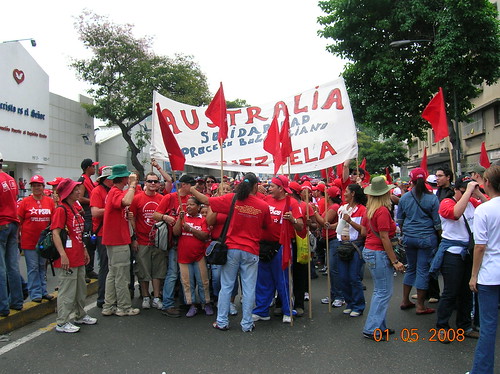Venezuela
December 1-9, 2009: Join the solidarity brigade to Venezuela and the see the revolution first hand

Marta Harnecker: Popular power in Latin America -- Inventing in order to not make errors

Honduras: Obama's first coup d'etat?

By Eva Golinger
[As of 11:15 am, June 28, Caracas time, President Manuel Zelaya is speaking live on Telesur from San Jose, Costa Rica. He has verified the soldiers entered his residence in the early morning hours, firing guns and threatening to kill him and his family if he resisted the coup. He was forced to go with the soldiers who took him to the air base and flew him to Costa Rica. He has requested the US government make a public statement condemning the coup, otherwise, it will indicate their compliance. At 5 pm, Roberto Micheletti, head of Honduras' Congress was sworn in as de facto president. At 7 pm, the Organization of American States condemned the coup. US secretary of state Hillary Clinton has formally condemned the coup. For continuing updates, visit Eva Golinger's web site at http://www.chavezcode.com/.]

By Federico Fuentes
June 1, 2009 -- Addressing the 400-strong May 21 workshop with workers from the industrial heartland of Guayana, dedicated to the “socialist transformation of basic industry”, Venezuelan President Hugo Chavez noted with satisfaction the outcomes of discussions: “I can see, sense and feel the roar of the working class.”
“When the working class roars, the capitalists tremble”, he said.
Chavez announced plans to implement a series of radical measures, largely drawn from proposals coming from the workers’ discussion that day. The workers greeted each of Chavez’s announcements with roars of approval, chanting “This is how you govern!”
Chavez said: “The proposals made have emerged from the depths of the working class. I did not come here to tell you what to do! It is you who are proposing this.”
Nationalisation and workers’ control
Michael Lebowitz: '21st century socialism needs a 21st century Marxism'

May 23, 2009 -- Michael Lebowitz is a Canadian Marxist economist. He is the director of the “Transformative practice and human development” program at the Caracas-based left-wing think tank, the Centro Internacional Miranda. He is professor emeritus of economics at Simon Fraser University and author of Build it Now: 21st Century Socialism and the 2004 Isaac Deutscher-prize winning Beyond Capital: Marx's Political Economy of the Working Class.
Lebowitz was a featured speaker at the World at a Crossroads conference organised by Green Left Weekly, the Democratic Socialist Perspective and the socialist youth group Resistance, held in Sydney, Australia, on April 10-12, 2009. Christopher Kerr spoke with Lebowitz about capitalism's crisis and the socialist alternative.
Given the current economic crisis, is Marxism still relevant?
It is more relevant than ever. Marxism seeks to explain the underlying reasons for what is occurring and to seek out the alternatives.
Socialist feminist revival spearheaded by Venezuelan and Cuban revolutions
May 4, 2009 – There is a revival of socialist feminism in Latin America, spearheaded by the Venezuelan and Cuban revolutions.
Michael Lebowitz: Venezuela's socialism of the 21st century
April 16, 2009 -- Michael Lebowitz has recently been in Australia as a featured guest of the World at a Crossroads conference, held in Sydney April 10-12, organised by the Democratic Socialist Perspective and Green Left Weekly. Lebowitz is professor emeritus of economics at Simon Fraser University in Vancouver, Canada. He is a program coordinator with the Centro International

Translated by Federico Fuentes
Cumaná, April 17, 2009
The heads of state and governments of Bolivia, Cuba, Dominica, Honduras, Nicaragua and Venezuela -- member countries of the Bolivarian Alternative for the Peoples of Our Americas (ALBA) -- consider that the proposed Declaration of the 5th Summit of the Americas is insufficient and unacceptable for the following reasons:
Luis Bilbao: The grand duel -- At the Fifth Summit of the Americas, a crucial battle is to be waged
By Luis Bilbao, translated by Gonzalo Villanueva for Links International Journal of Socialist Renewal.

World at a Crossroads: Fighting for socialism in the 21st Century
Easter 2009, April 10-12, Sydney
Venue: Sydney Girls High School
World At A Crossroads is a conference that brings together hundreds of socialists, progressive activists and Marxist thinkers from around Australia, Latin America, Asia-Pacific and North America in dozens of panel presentations and workshops dealing with the urgent questions that confront us all: war, imperialism, food security, racism, workers' rights, sexism, the media and culture. Feature sessions and streams will include:

By Federico Fuentes
March 21, 2009 -- “This government is here to protect the people, not the bourgeoisie or the rich”, proclaimed Venezuelan President Hugo Chavez on February 28, as he ordered soldiers to take over two rice-processing plants owned by Venezuelan food and drink giant Empresas Polar.
The move was made in order to ensure that the company was producing products subjected to the government-imposed price controls that aim to protect the poor from the affects of global price rises and inflation.
Under Venezuelan law, companies that can produce basic goods regulated by price controls must guarantee that 70-95% of their products are of the regulated type.
“They’ve refused 100 times to process the typical rice that Venezuelans eat”, said Chavez. “If they don’t take me seriously, I’ll expropriate the plants and turn them into social property.”
Win a trip to Venezuela! Drawn on August 30, 2009
Win
a trip to Venezuela!
…and strengthen the solidarity movement with Venezuela’s
revolution